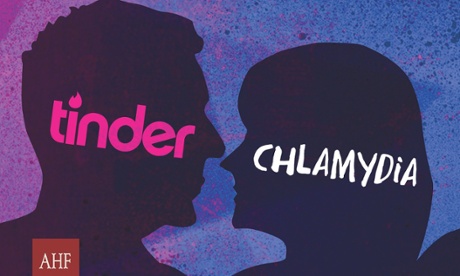
A recent billboard campaign by the Aids Healthcare Foundation (AHF) encouraging users of dating apps Tinder and Grindr to get tested for sexually transmitted diseases has led to backlash from the two companies.
Tinder sent a letter to the foundation demanding it remove all references to the hookup app from their billboards and that it cease making “false and disparaging statements against Tinder”; according to the AHF, Grindr halted the foundation’s paid advertising for its free STD testing services on their site.
“They’re tone deaf,” Michael Weinstein, president of AHF, told the Guardian. “It would have been much wiser for them to say that they’re concerned about their customers and look forward to working with us to help people get the checkups that they need. This would not have been the global story that it has become if they had not responded that way.”
In an emailed statement, a Grindr spokesperson said that they have “always been concerned with the issues of men’s health” and with keeping “users informed and aware of health issues”.
They added: “We were surprised at the approach the AHF took, and paused the campaign in order to speak with them and assess our relationship. In the end, we’re all on the same page regarding this issue, as health and wellness concerns us all.”
The ads, which suggest that users of the apps are at risk for diseases like chlamydia and gonorrhea, show the silhouettes of two couples leaning in. Tinder and Grindr are plastered across two of their faces in large pink letters, while the remaining two silhouettes have the names of STDs on their profiles. To the right of the couples, a website for free STD testing is listed.
“There are consequences to hooking up,” Weinstein told the Guardian. “That’s not a moralistic judgement. It’s just a fact and minimizing that is important.”
Currently, there are 12 billboards up in Los Angeles and 45 bus bench ads. According to the AHF, they plan to expand the campaign to New York and south Florida.
One of the billboards is only a few blocks from Tinder’s Beverly Boulevard headquarters, according to CBS affiliate KCAL9 TV. Tinder sent a cease and desist letter to the healthcare foundation on 18 September.
“These unprovoked and wholly unsubstantiated accusations are made to irreparably damage Tinder’s reputation in an attempt to encourage others to take an HIV test offered by your organization,” the letter read. “While Tinder strongly supports such testing, the Billboard’s statements are not founded upon any scientific evidence, and are incapable of withstanding critical analysis.”
The foundation responded just under a week later to deny Tinder’s request, saying it had “not made any false or disparaging statements against Tinder”. The organization cited an article in Vanity Fair titled Tinder and the Dawn of the “Dating Apocalypse that explores the role dating apps play in “encouraging casual sex among young adults” and a report released by the Rhode Island Department of Health in May that credited the rise in syphilis, gonorrhea, and HIV between 2013 and 2014 to high-risk behaviors like “using social media to arrange casual and often anonymous sexual encounters”.
They added: “Rather than trying to chill AHF’s public health message by threatening AHF with frivolous lawsuits, AHF urges Tinder to support its message of sexual health awareness by encouraging Tinder users to get tested for STIs and to get treated promptly if they have an infection.”
Tinder did not respond to requests for comment.

